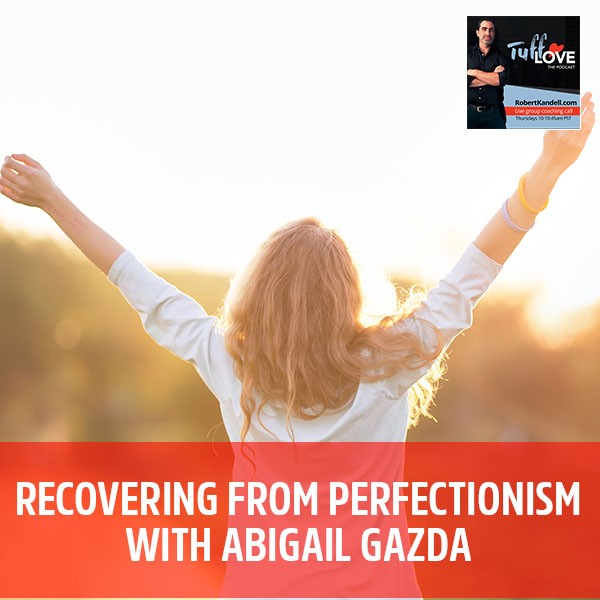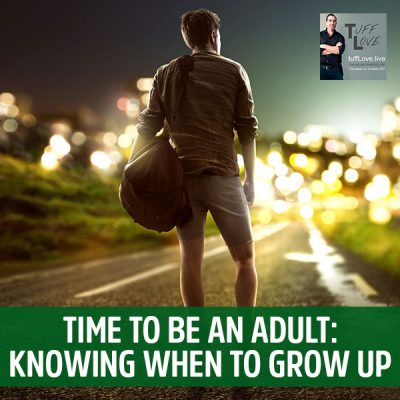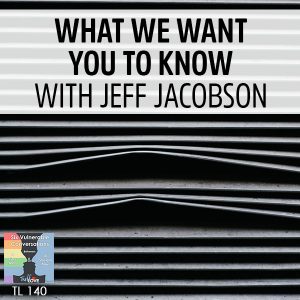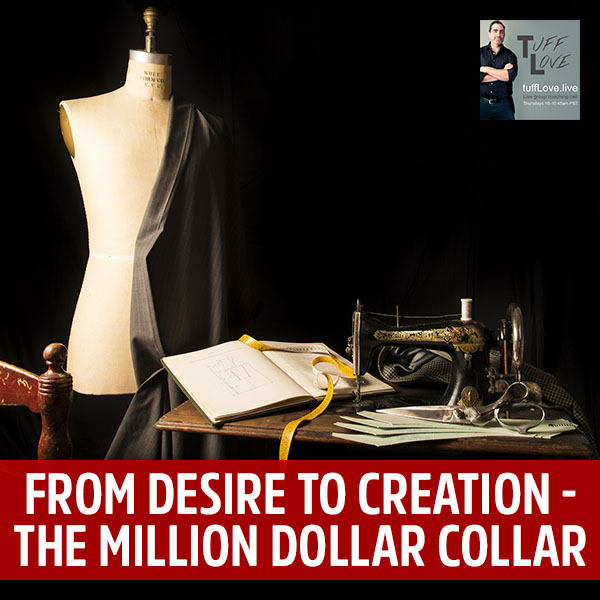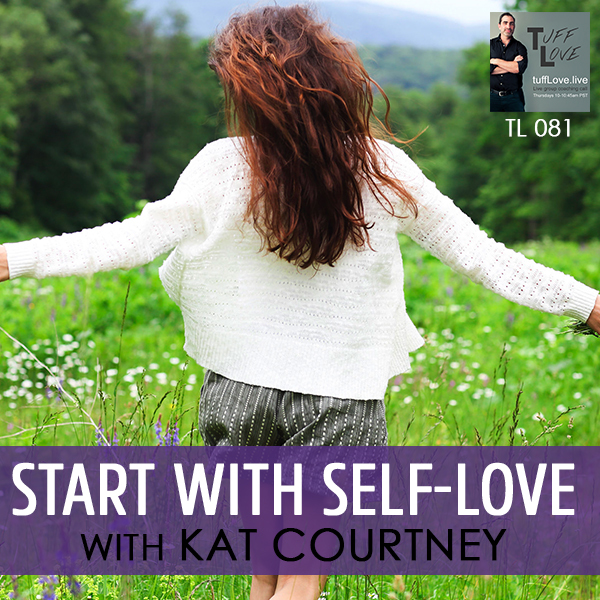
081: Start With Self-Love with Kat Courtney
Jul 18, 2017
Everyone has a part of themselves that they don’t feel comfortable or don’t like and they feel that it isn’t an ideal part of their life. This is called the shadow, a part of the unconscious that we push away, but shouldn’t because it is still energy that we can transform into a positive experience. Kat Courtney encourages people to own their shadow instead of it owning them. She shows people that self-love is the first step in utilizing the shadow, so that you don’t end up looking like a volcano about to explode. Learn how to identify anger and how to channel it into a positive energy.
—
I have a guest star on and I’m really thrilled to announce, her name is Kat Courtney of AfterLife.Coach. She’s an amazing human being whose blog ran across my Facebook feed and I’ve been pretty hooked on her work since then. She’s an amazing, fun, intelligent, twelve years in the Ayahuasca world, left recently and help people with their transitions through life, death and beyond. Comes on the show and shares her knowledge. We then have Jay and he shares the danger of being a giver, not authentic giver but a faker giver, but also just trying to live his life and connect with human beings in the world.
081: Start With Self-Love with Kat Courtney
I have a very good friend of mine, Kat. She is our guest star of the week. We’re going to be talking about this concept about your shadow, your darkness, the parts of yourself that you don’t quite agree with. That little skeleton in the corner, that little je ne sais quoi part of yourself you’re not too pleased about, and how to love it. The importance of loving it is to love other, you must love all parts of yourself. That is the main topic of the show and I’m sure we’re going to dive into a whole bunch of places. Kat, how’s it going?
I am awesome. Thank you for having me, Robert. I’m happy to be here.
Give us a little bit of your story. How did you go from point A to point B? Give us a little synopsis so we can get a feel for you.
About twelve years ago I went to the jungle for the first time and drank Ayahuasca, which if the audience don’t know, it’s a really powerful psychotropic plant brew that’s been used in South American Shamanism for thousands of years for healing, expanding consciousness and all that good stuff. At the time I was an executive at Disney, but I was a bit of a hot mess, that bipolar and not in the space of self-love. Through a journey of about a year and a half of drinking a lot of that medicine and working with the Shamans, I started really opening up to this place of shadow and learning to love the parts of myself that weren’t what I would consider ideal or perfect.
Through that process I got a calling to dive straight into becoming an Ayahuasca shaman, which, who knew a white girl from Montana could do that, but possible. I apprenticed for many, many years and sat in thousand plus ceremonies and got to the place about a year and a half ago where I felt I actually am more the messenger and less the healer, so to speak. I had been pretty outspoken about the usage of Ayahuasca, the space of self-love, what shadow is, all of that stuff, and that’s why I’m here. That’s in a nutshell.
Why do you think a white girl from Montana can’t be a shaman? What’s the thought behind that statement?
First of all, it was certainly a reflection of my lack of self-worth at the time of just thinking, “Why me?” It’s an awesome responsibility because I’ve witnessed people walk away from Ayahuasca ceremonies cancer-free or having released their PTSD, or all of these miraculous things. I hold the shaman as a really, really integral role in that. Working with the indigenous people, I was like, “Can a white girl do this?”It turns out yes, anybody can do that. Consciousness doesn’t exclude based on anything. I got to learn by experience that anything is possible. I’m really grateful that I had some amazing teachers from the indigenous cultures that took me on and didn’t care about the color of my skin or my gender, that’s for sure.
Let’s dive right in to this concept of darkness. Would you define that? Everyone has a viewpoint or a concept of what a shadow is or what their darkness is, how do you describe it?
I’m a student of Carl Jung, Thomas Moore and James Hellman, and these gentlemen that really are the pioneers of this thought process, Corleone being the Godfather. In a simple way, shadow is just that part of us that is unconscious. It’s also the space where the thing that don’t necessarily love about ourselves, dwell there. Anytime we react from anger, we’re coming from shadow. It’s essentially darkness. We are taught in our culture to want to push that away, to assume all of that is bad, that we’d rather not feel any of that. We’d rather not even acknowledge we have that. My perspective is that there’s a Mother Teresa and a Hitler in all of us. The more we refuse to look at Hitler, at the darkness, the more it has ownership and power over us.
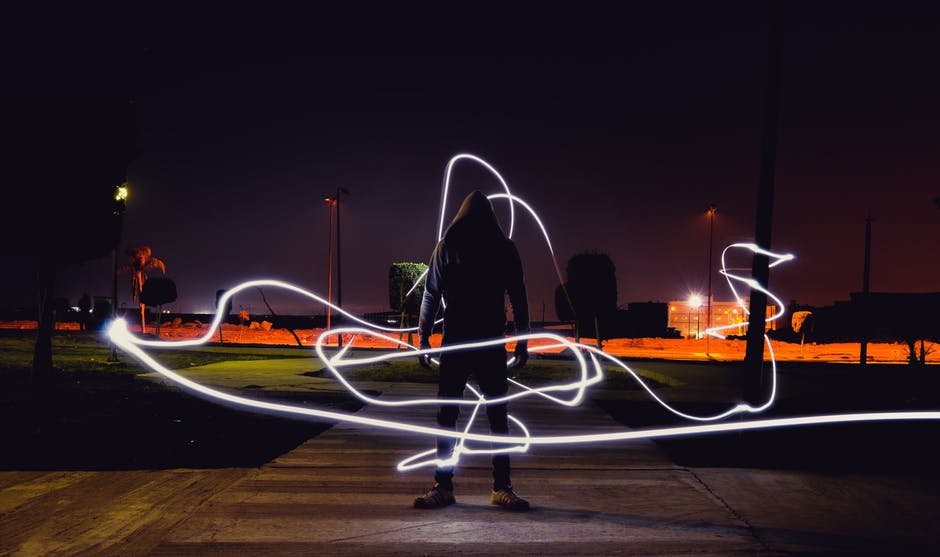
Self-Love: There’s a Mother Teresa and a Hitler in all of us. The more we refuse to look at Hitler, at the darkness, the more it has ownership and power over us.
Hitler is a pretty extreme example, that’s a great example. Someone discovers through plant medicine, through therapy, through life, that they discovered this part of themselves, their own Hitler. The part of themselves that they have just not going to accept no matter fucking what. Then what do you do? How do you educate them or show them to make friends with that part of themselves?
The most tangible way I know to do that is to ask them to first look at the results in their lives, for the choice of resistance. Any space of resistance creates more conflict with that energy, which gives it power. If we have resistance to our anger, we push it down, it’s going to show up in our lives somewhere, whether it’s in our relationships, our relationship with our self, our job, our relationship with our kids. Somewhere, if not everywhere in the results in our lives, that resistance to shadow is causing conflict. It’s not creating the life that we want. The first thing is ask somebody, “Are you happy and content?” with the results that you’re creating with this kind of denial of shadow. If they’re honest, the answer is always no. That gives you a foundation to work from.
All of a sudden, I’ve got a Hitler inside of me, it’s causing ruckus in my relationships, what’s your next step? How do you guide people to become friends with them?
The next step, and it’s very individual to each of us, but it’s time to actually feel that energy. Let’s use anger as an example. Most of us do one or two things with that shadow energy. We either it stuff it down and resist it, or we vent, we blow up. Both of those are two sides of the same coin. Venting is not an honest feeling of it because it’s blaming somebody else, it’s victim consciousness, it’s defensiveness, it’s actually more of shadow energy. Whereas if you flipped that and you receive it, feel it and express it, that doesn’t come across as defensive or accusatory.
You just say, “I feel angry. I’m feeling this,” and you open yourself up to the opportunity to feel and process it. Then it doesn’t get stuck and it’s allowed to move. I work with people to identify all the places in their life where they’re either venting and being a volcano, or stuffing it down, resisting any of these shadow emotions to create a new relationship with them, because emotions energy in motion. If we’re doing that in a really conscious way, than we can actually take those shadow things that we feel like are our flaws and make them part of the toolkit of our empowerment and the things that make us really strong, but it’s feeling.
I’m going to ask you a little more personal things. You obviously started off, like you said, a stressed out bipolar Disney executive, and now you’re a life coach and an incredible writer, writing an incredible blog. There are parts of yourself that the medicine and the process showed you. Would you explain your own journey on something specific and some part of you that you didn’t accept? What was the process of the medicine or how did you become friends with it?
I’m going to go back to my first cycle. It’s actually my second ceremony, and a cycle is usually three or four ceremonies. The second cycle was nightmarish. It’s hard to describe what this medicine does to show you the energy that you’re resisting. In my case, I had a lot of ego around thinking that I was a giver, that I was really good to the people in my life. I didn’t realize I was very egoic about that. It was just like, “That means I’m a good person. I give a lot.” What the medicine did, it was very masterful. In a ceremony, the shaman often does healings, gets up and starts working on people and helps them move the energy they’re working with
As the shaman got up and started working on people, every single time he pulled something from somebody, it would sail across the room and hit me in the chest, and I would start purging, which is a normal thing in ceremony, to purge and release the energy. This isn’t normal that you’re sitting there as a participant and everything’s coming at you. It happened to the point where I literally thought, “I can’t take any more, I’m going to go insane.” I asked the medicine, “What is this?” She’s like, “This is what happens when you take on everybody else’s problems and you ignore yourself, your own darkness.”
I was sitting next to my boyfriend at the time, bless his heart. He’s a special effects producer from Hollywood and does horror films. I was all about taking care of him and his darkness and not judging it and allowing space for that, but did not do the same for myself. The medicine showed me very tangibly by putting me in a position where I thought I was going to go insane. I had to take any more by showing me this is how I showed up in my life. I had to make a decision to put myself first in that place and allow myself to feel everything that I had within before I go around and serve everybody else. She showed me this analogy that I talk to people in what I’m coaching.
When you’re on an airplane and they say in the event of the loss of cabin pressure, put on your own mask before helping others. She showed me in a vision that my mask was on another galaxy, and here I am running around trying to be of service. She was like, “Girl, you got to put on your own mask.” even though it feels selfish. It’s actually the best thing that we can do for humanity, because that way when we’re showing up to the people in our lives, even coaching clients, our partners or our kids, were doing it in a space of love, grounded-ness and compassion, rather than this martyrdom, that I at least was coming from.
I have similar stories as I’m sure most coaches and healers who think that, “My problems are so insignificant. I’m here to hold the room. I’m here to be of service to the world. I’ll take care of you and avoid all my own shit.”It happens time and time again. You’re saying that was a total block. You had no concept of that, and in the experiences where you really saw this side of yourself.
You said the magic word, ‘experience’. Someone could have told me I was showing up that way and I don’t think I would’ve heard it. I had to have this tangible experience in this intense ceremony and realizing this is not only detrimental, this could kill me prematurely. This energy of taking on everybody else’s crap and ignoring my own, it’s not a healthy way to live. I’m very grateful I figured that out at 30 and started implementing changes, rather than live another several jackets that way and be more and more miserable.
This energy of taking on everybody else’s crap and ignoring you own, it’s not a healthy way to live. Click To TweetYou’ve been really deep in the Ayahuasca world. How long ago was your first training?
About twelve years ago.
You’ve really seen a change, you’ve seen the morphing of it. There’s a lot of people out there who say Ayahuasca has become mainstream, that people are not using it well, that people are abusing, it’s becoming a party drug. Do you have any viewpoints around that particular?
Yes. At the end of the day, it’s not my business. It’s the medicine’s business of how popular it’s becoming, how people are using it. I’m actually working on a blog right now about the westernization of this process and how from my personal perspective, it’s not a good idea. Even though I am all for individuality and self-expression and I’m very much a rebel rather than a conformist. I’m very loyal to the tradition of this process because it’s been cultivated for thousands of years, and who am I to think I can change it up and do it better. More importantly for our culture, the westernization of this healing process is only going to bring about the same crap we’re dealing with as a western culture.
I say the same thing to the culture, I went to an individual, are we happy with how we’re showing up as a culture with our shadow and the way we’re acting as healers? Because I think most of us would agree we’re in a space of crisis and a dark night of the soul ourselves. By Westernizing Ayahuasca and Shamanism, we’re doing ourselves a disservice because we’re just going to create more of the same, which is darkness on top of darkness on top of darkness until we wake up and start honoring things that aren’t broken, and maybe have the humility to admit that some of our ancestors may have figured things out in a way we haven’t. That are our individuality and our independence is not always something that serves us.
What is the westernization of the medicine? How would you describe that?
For the most part, it’s people that had sat in ceremony a handful of times, feel like they have a good connection with the medicine and just decide to facilitate. They dismiss the need for the training and the apprenticeship. Essentially, the traditional protocol is that you work with a master seven to twelve years before you even pour a single cup for someone else. It’s like going to med school, you don’t wake up and decide I want to be a doctor and then go start doing surgeries the next week. That’s exactly what happens with the more Western independent, “I can do this. I get it.” Because it’s esoteric and it’s very energetic, it’s easy for the ego to think, “I got this figured out.” There’s no harm no foul, which is not true. That’s how I would define the westernization, it’s the independence of “I got this, I know what I’m doing,” and I just humbly disagree.
I thought of the American bravado or the American ego there. I see this in the coaching practice. I see this a lot in teachers and educators. When I began my practice in1999 or 2000, I had six months of man-woman dynamics under my belt before even that. Then I started coaching my friends and really judging them. I think what came across was my judgments. My relationship is so much better because I’m working on and your relationship sucks because you’re not working on it or not talking about it. The memory of my arrogance is embarrassing. It’s completely embarrassing. Then I learned from that. I lost a friend because I was on my high and mighty horse instead of actually doing the training to understand what it takes.
The irony is, at least to me, that I get accused of being an elitist a lot by being very honorable to the tradition, but it’s sort of the flip. By me putting my ego aside and saying, “You know what, the tradition knows more than I do.” I still get accused of being elitist that the tradition knows more than the person who was facilitating after a year of sitting with the medicine. You’re going to get the feedback no matter what you choose, but you’re choosing wrong from someone. That’s why I’m really still very cautious about putting the traditions first before making any even subtle changes to how the process goes.
I first heard about Ayahuasca in New York City in 2007, when an officemate talked about it. I was very sober at the time, but it sounded really great. It reminded me of my acid and mushroom experiences of my youth when I was just a beer slip of a youth. It took me until 2015 to actually have my first experience. I love when people say, “You won’t do the medicine until the medicine calls you,” and I really am a strong believer in that. I like how you said you believe that the medicine knows what it’s doing, it’s the medicine’s business. It’s the medicine’s business, but we have people and their ego facilitating. How do you work with that juxtaposition or that contrast?
My immediate answer is I stay away from it, in terms of I think are operating with their ego. If people ask me for advice of where to sit, I’m really choosing and careful. At the same time, I wholly support that we learn our lessons by stepping into that expansion, that ego. That’s the process. It’s a process that I learned my lessons, it’s either through inflation or contraction. I do my best not to judge it, but at the same time I’m not going to sit with those people that I feel haven’t had that really honest connection with their own ego that they know when they’re showing up in that.
Then you decided to stop taking the medicine. How did that happen? How did you hear that call and how has it been since you’ve made that decision?
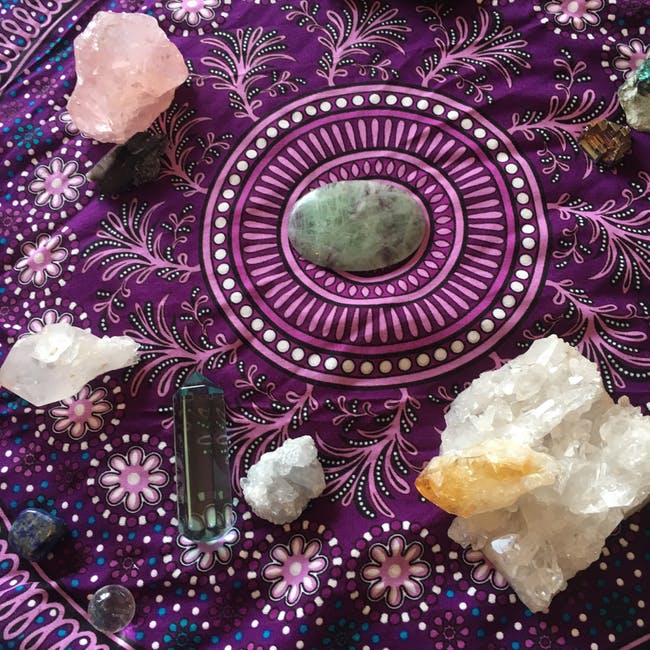
Self-Love: I was never a healer, I was always just a vessel to help people heal themselves.
That was an identity crisis to top all identity crises in my life, because I was so all in to being an Ayahuasca shaman. There’s where my ego got involved. I got very attached to how the story ended, that I was going to spend the rest of my life running ceremony and there was no arguing. The more I did it, the more than medicine was pushing me out of the circle and I’m like, “What’s going on? I’m doing everything possible.” Until I had this epiphany once in ceremony that I didn’t even resonate with the title of healer anymore, because I was in a place where I felt there was nothing to heal.
Not to say that the suffering of the world isn’t incredibly real, it’s just I started really understanding the very divine purpose of that suffering. I was never a healer, I was always just a vessel to help people heal themselves. I started really disconnecting from the whole spirit of being a healer to begin with, and then I let go. As soon as I let it go, it just came in that I’ve been the messenger all along. I’m the messenger not the healer, that’s my role. Once I owned that, then the world opened up again and I was happy again instead of conflict, but that was a tough letting go. That was the toughest surrender I ever did with the medicine.
I have friends who have been pushed out of the circle as well, and watching their transition, the painful transition and the important transition to hear that call and listen. I guess I had my own experience of it with my business. I was nine years into the business and thought I’d spend the rest of my life there. Then the call came, it’s like, “I don’t want to do this rest of my life,” and just the transition. I guess what you’re describing can be translated into so many things, family, relationships, business, professions, and the power to actually listen to it takes a lot of courage.
If there’s one thing that I’ve learned about the spiritual path, whether it’s with Ayahuasca or anything, any modality, it’s that the universe is always working with our attachments, and so were clinging to a space of identity, even if it’s something to be of service, that clinging, that attachment will have to be dealt with, eventually. Because any attachment is contraction, it doesn’t allow for the maximum expansion, and if you’re attached to something that isn’t aligned with who you really are, or it’s just shifted, then it’s going to get uglier and uglier, it’s not going anywhere. I love the expression, “That which we resist persists.” It’s all about being able to finally admit, “There’s a shift happening. I should ride that way, rather than fight it.”
We’re going to bring our coachee. Jay, how’s it going?
It’s going pretty relatively well.
How can we best be of service to you? What was the conversation you’d like to have?
You’re talking about giving, being a giver, and recently that’s something that I’ve been struggling with. I’m realizing there are certain facets of having a giving nature that are detrimental to my own mental and emotional health. I’ve been struggling with that recently because I’ve been noticing that even when I consciously try and pull back and take care of myself, sometimes I’ll be in situations where someone asks me something and if I can do it, I do it. Then afterwards I feel drained and tired.
I think that’s going to resonate with a lot of people. Do you have any initial thoughts, Kat, on his inquiry?
How does it make you feel when you say, “Not yet,” when you draw a boundary for yourself?
I haven’t done that. That’s the thing is that I always keep saying yes, and taking that initial step back doesn’t happen. That sounds really nice, given that opportunity to say, “Give me a second, let me make a decision,” but it doesn’t come up.
Can you name what the fear around that might be? Were you afraid would happen if you said, “Not yet?”
The perception that I’m not being helpful or being open. My identity for so long has been I help people or help facilitate what they need to work through. I’m a massage therapist by trade, so it’s what I do. With my interpersonal relationships, what ends up happening is I meet a lot of people who end up telling me a lot of their deepest, darkest things, or they need something and I feel like, “I’m strong enough to be there,” and then eventually what ends up happening is I put everything by the waist side. I don’t think about, “What do I need right now?”because I’m so wrapped up in everyone else. There are moments where I feel uncomfortable, but I lean into it, thinking, “I can expand more. It’ll make me a better person.”I don’t have that thought, not yet.
If I said, “Will you pay my taxes? It’s $10,000, you’d say yes to me?
No.
Did he just say no?
Yes.
You do have the ability to say no.
Yes, I do.
If Kat asked you to pay $10,000 for taxes, what would you say?
No. My mind goes to, “How would I do that?” Then I can’t, so no.
What if it’s $500?
I don’t feel comfortable doing that.
Not yet’ is not a ‘no’ but it’s still a boundary. Click To TweetWhat I’m seeing is you do have boundaries and you do have yeses and no’s inside of you. That’s good, because you can build on those. The $10,000 to the $500, there’s something in your mind. $10,000 is so outrageous, it’s so insane. It’s so unreasonable. Your immediate energetic answer was no to me, but when I said to Kat, it was a little softer. Maybe because she’s a woman, I’m not quite sure, but it was little softer. There was a little no but then we brought it down to $500, then you actually thought about it, you insane man. Any thoughts on that, Kat.
The exploration is finding where those boundaries are and then being willing to stretch them. You know in your body when somebody asks something of you and it doesn’t feel right to say yes, that pause and listening to that. I use the word, “Not yet,” by the way, are words intentionally, because that’s how I’ve trained myself to be able to say no because no is harsh. I contract around that. ‘Not yet’ is not a ‘no’ but it’s still a boundary. The invitation that I have is you can play with that a little bit until you get strong and it’s a ‘no’.
What do you think? What comes off for you when she just said the last piece?
The “not yet” gives me an opportunity to really work with how I feel emotionally around it. The harshness that you’re talking about that makes perfect sense, that I don’t want to come across harsh. As a result what I definitely see show up more is that people will take advantage of the fact that I don’t have a strong ‘no’ reaction in several different things. Even when there’s something in front of me that really bothers me, and I don’t go, “No,” I come and go. “I’m not going to get offended by that. That’s okay.” Then the reality is that later I actually do feel really angry. Having a softer approach in my mind actually feels better, because it feels I could actually step forward and start here, and then get strong there, so that you’re not immediately reacting. That’s the issue, I don’t like reacting harshly or too intensely with people, because I see them get scared. I don’t like causing fear.
My old people pleaser would say yes to a lot, but I want to say no too, because I wanted to be liked by the person making the request. It was more important to me that they liked me than my own personal boundaries. Now in my older age, my 47 years of vast experience, so saying yes a lot where I meant no, I’ve learned that liking them is less important than my own personal boundaries. Bring it back to you, what’s your relationship with saying yes to things you want to say no to, and being liked by that person?
What’s funny is that I feel like if I say no to people, I’m not being myself, which is silly. I like being in service to people, it feels good. The reality is that I don’t know how to navigate that in a healthy way, because my initial reaction to everything is pretty much always “yes‘. I had a friend that pointed out that she said, “Whenever I say your name, Jay, you don’t say ‘What?’ you say ‘Yes?’ You should probably pay attention to that” I was like, “I don’t really get that? My response is ‘yes’ not ‘what’.” It’s always an affirmation and making sure that they feel received, despite sometimes even my own emotional makeup at that moment. I think by pleasing others, I feel good. Someone was telling me that there’s no such thing as an altruistic action, it was always a give back. My give back is whenever I give something and I see it received well, I feel good about myself to a degree.
How does it feel when you do something that’s entirely for you?
The only thing that I’ve done recently for myself is I started working with a personal trainer, and going to the gym every day thinking this is what I want to do for myself. I feel really good after I go and do it. There’s some resistance sometimes when there’s other stuff going on, to think, “Should I go do the other thing?”and then I realized if I don’t take care of myself doing this right now, I’m going to be distracted, but there’s still a conflict. The best feeling that I get is after the workout when I’ve actually done it, but mostly during the entire workout I’m thinking about what I should be doing somewhere else. I’m not always fully present with it, and that’s really annoying.
How does it feel to pay for yourself? How did it feel to actually do something nice for yourself? There’s an emotion there, right?
Whatever I have, sometimes I feel like trying to give it to other people, because I like seeing other people happy. I always think, “I can either meditate or something small for myself and that’ll be just enough,” and the reality is, recently, it’s not. It’s showing up in any new interpersonal relationship that I have, anyone that I start to date, where it’s like a give and give and give. Then I get tired and go, “What’s this tired/exhausted or emotionally turbulent feeling in my body?” I don’t know how to ask for what I want, I really don’t know how to ask for what I want.
Do you have any example in your life where you’ve done that and gotten a certain result? Can you bring up a place where you ask for what you wanted?
I asked someone for a more a serious relationship recently, and it floundered. There was no real resolution to the conversation because I wasn’t so resolute in the answer being a yes or no, it was more how they came forward to me clean and said, “I want this thing,” so it was very weak. That’s how it was received and that’s how it was worked out. It was really uncomfortable, and it was another example of asking for what I wanted. The other thing that came up, because I showed up to an ex-girlfriend’s house to be the friend.
I always kept going over there for a song writing thing with a bunch of other people, it turned out there was only one other person, and then I came back. I wanted to show up as just a friend, but there was also another aspect where we were still attracted to each other, and so I fell into this thing where she wanted something from me and so I gave in. What I wanted was just to be a friend, but I gave in to what she wanted and that was really uncomfortable.
You have a lot of tangible examples of when you give people what they want versus what you want, it doesn’t feel good?
It feels confusing and aggravating, because it’s like, “Is there another side to it, like causing harm for them?” and the reality is I’m ignoring, “How is this harming me?” Because I keep going back and looking at it and going, “I feel uncomfortable, but I don’t know what the actual harm in my body is,” I want a stronger feeling of, “I don’t want that,” and it’s okay, and that’s hard for me to accept.
Did you ever had the experience of a woman admitting that she faked it in bed? I have.
No.
I have, and I can tell you it’s one of the worst feelings that you can have, but then I can have. It’s not my fault to a degree, it’s the woman’s training. It’s society teaching women to do that. I actually got honest with the woman and she admitted, then I felt horrible because she was so concerned about me that she faked it, and didn’t ask for what she wanted, but that’s what you do. You’re the woman faking the orgasm.
I’ve actually done that.
You faked it like you’re enjoying it?
Yes, a lot actually.
You think this is service, but it’s actually falsehood. It’s manipulation.
That sucks.
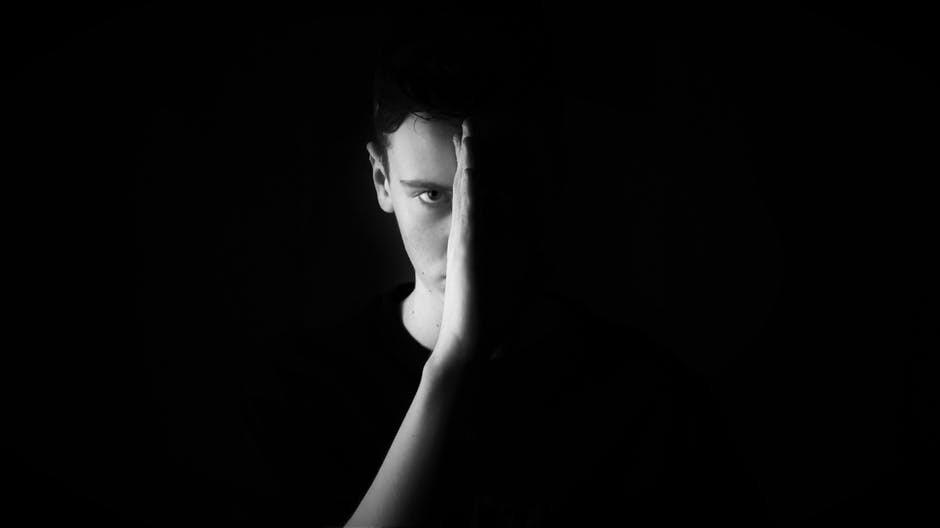
Self-Love: Men have been taught to push down who they are to be nice, but underneath that nice there’s an extensive amount of anger.
Yes, this is Tuff Love by the way. It’s your nature and I want to actually make this slightly softer for you and then we’ll make it hard again. You’ve been trained to do this by society. You’ve been trained to be a nice guy. Have you read No More Mr. Nice Guy by Dr. Robert Glover? You should read that again, the world’s most horrible book ever written, because it’s so good. The point is that men have been taught to push down who they are to be nice, but underneath that nice there’s an extensive amount of anger, and that sickness and exhaustion you feel is you not even touching your anger, which is underneath your nice guy. You’re such an incredible human being. I’ve had the fortune of teaching you. I know who you are. You are pure enthusiasm and you’re covering it with this bullshit nice guy. The women in the world want to know who you truly are. They don’t want to be fooled by the nice guy.
I definitely feel like I can’t always be the full capacity of who I am around people because I felt like it would be pushed away. That was an old fear of, “I don’t want to be alone,” and now my new concern is, “I don’t want to be in the wrong company.”Then how do I pick the right company or is there such a thing? When you’re talking it makes a lot of sense, Rob, is that I definitely started with, “How much can I show before people can push me away?” The reality is, “I’m really tired of veiling that because it is basically falsehood, and I don’t like lying.” Consciously lying, but subconsciously I’m apparently extremely good at subsection. Keeping things back.
The thing about what you just expressed is you know what the anecdote is then. That if it’s the manipulation, the lack of speaking your truth that hurts, not just you, but the people you’re interacting with, then the solution is tell the truth. I just say do it and see what happens. The relationships you think that may crumble in your truth can strengthen, because you’re showing up authentically.
Then when you go to sleep at night, you feel so good that no matter what happens in the results of how people take your truth, you’re speaking the truth. Just try it. As we were talking before, there’s a difference between venting your anger and expressing it, so you can play with that. Don’t feel like you have to be perfect out of the gate, but you just described what the solution to that pain that you’re carrying is.
One of my friends says, “Jay, you always show up to a social situation and analyze everything about what’s going on first before you actually show up and say what you want or what you want to do.” Yes, that that being perfect thing, that’s a big piece is that I always feel I have to be skillful all the time, and that’s hard, so I second guess myself a lot
Do you hold the people that you adore in your life accountable for being perfect?
No. In fact I specifically tell them, “You’re not perfect. It’s okay. We all screw up.”
Why are you so special that you don’t get the same treatment with yourself?
I don’t have an answer for that.
You’ve got a lot of things to really think about. I just want to express my gratitude that you’re willing to come on and be transparent, vulnerable and talk about something. I also make it feel better or worse, but what you’re talking about is very common. It’s an epidemic of nice people and givers. There are so many people out there with the same thing, so you being transparent and asking you that question that Kat just asked you, “Why are you so special that you have to be perfect?” I think that’d resonate with a lot of people.
Make sure that by saying yes to somebody, you’re not saying no to yourself. Click To TweetThank you guys so much.
I got two quotes for you from the group, here’s a phrase that helped me, “Make sure that by saying yes to somebody, you’re not saying no to yourself.” Steven asked a question, “Do you think you’re going to miss on something by saying no? Is there FOMO in there, is there some Fear Of Missing Out?” Two things just to think about.
Thank you guys.
Kat, how do people find you? How do people work with you? Your blog is amazing. Give yourself a little pitch and how do people find out where the Kat lives?
My moniker is The After Life Coach. You can find me at AfterLife.Coach.
Do you work one-on-one? How do you do the coaching?
Yes, I work one-on-one with people that are either dealing with medicine, of course, that being an expertise. I help people integrate any psychedelic spaces, any alternate spaces, and also the altered spaces that life throws at you. People in existential crisis, in the darkness, in the shadow, needing some sort of guidance, I’m there. I also work with people who are transitioning. I love being around the moment of death, because that’s the ultimate experience of shadow. I work with people that are at the end of this chapter too.
You also work with people in relationship with people close to death. That’s a really important thing and a challenging thing. You’ve got quite a great skill set to offer the world. Thank you so much for doing what you do in the world.
Thank you Robert, you too.
For more shows, please check us out at TuffLove.Live. Subscribe on iTunes. Tell your friends, you’re your enemies. Tell people you want to have more in your life, we’re just here. Thank you, Kat for being on the show. Take care, go forth. I love you.
Thank you so much for joining us on Tuff Love, I really enjoyed that show. Kat, you are amazing. It was super fun. I love when people ask questions that I never would have asked. You did that a couple times and then just really liked the way it flowed. Thank you so much Jay for just being out there in the world and being human. You’re okay, it’s okay not to be perfect. Part of your humanity is the imperfection.
Resources mentioned:
About Kat Courtney
 There’s life before Ayahuasca, and life after.
There’s life before Ayahuasca, and life after.
Before, I was a video game producer full of bipolar tendencies, bouts of destructive depression, and anxiety so intense it landed me in the hospital, multiple times.
Then came Ayahuasca, right after I turned 30. Within two cycles (7 ceremonies), I was ready to devote my entire life to the study of shamanism. “You’ll bring thousands of people to this work,” she told me.
As usual, she was right.
I’ve been training for 12 years, drinking in more than 1,000 plant ceremonies. I have completed 6 master plant dietas to date, spanning over 3.5 years. I gave up almost everything for this work, and got back even more in return. The universe is magical that way.
I now work as an Ayahuasca Shaman at Rythmia in Costa Rica. I’m in ceremony 2-3 times a week, and I am so immensely honored to be in constant service to this incredible, world-changing plant spirit.
Podcast: Play in new window | Download




